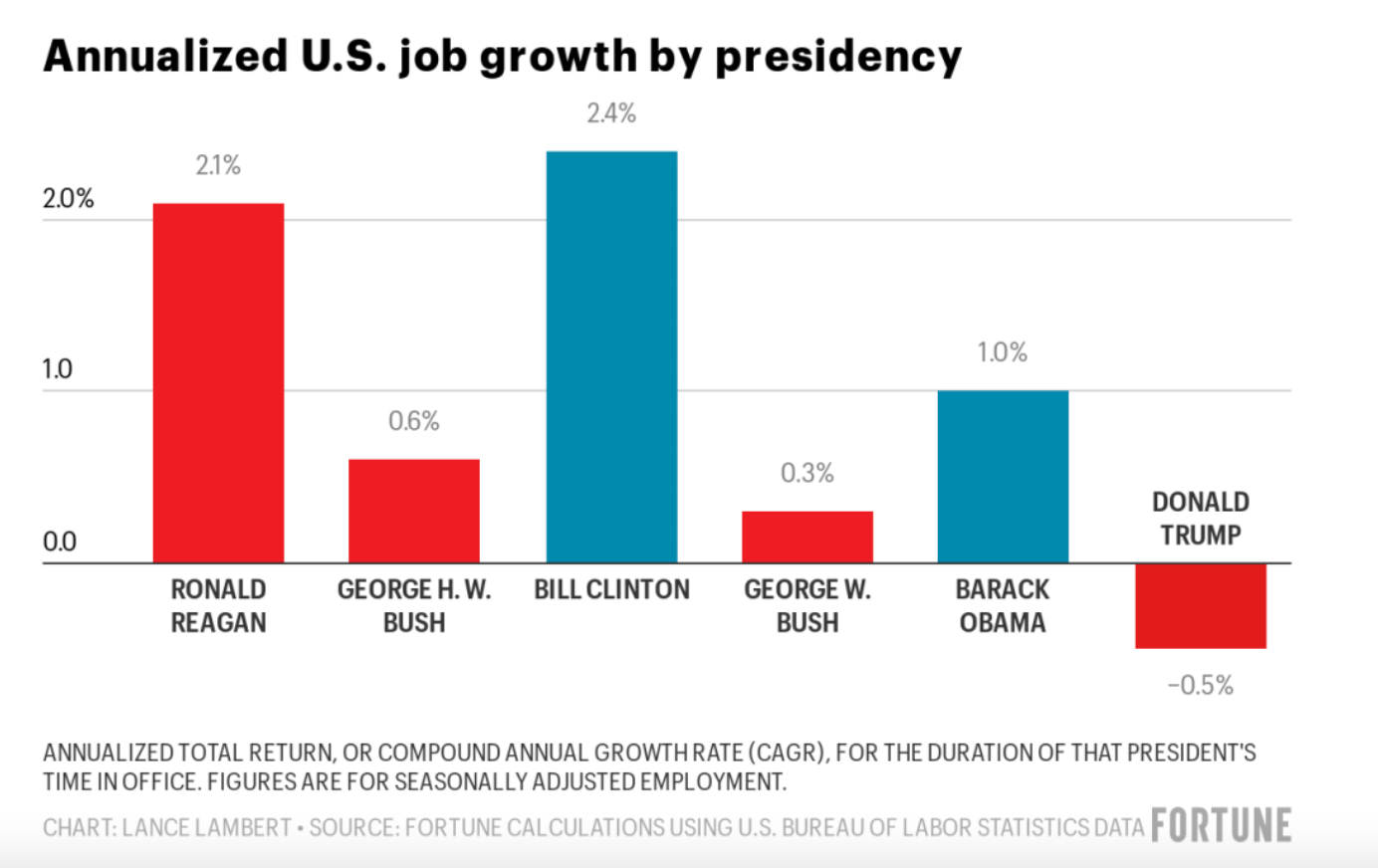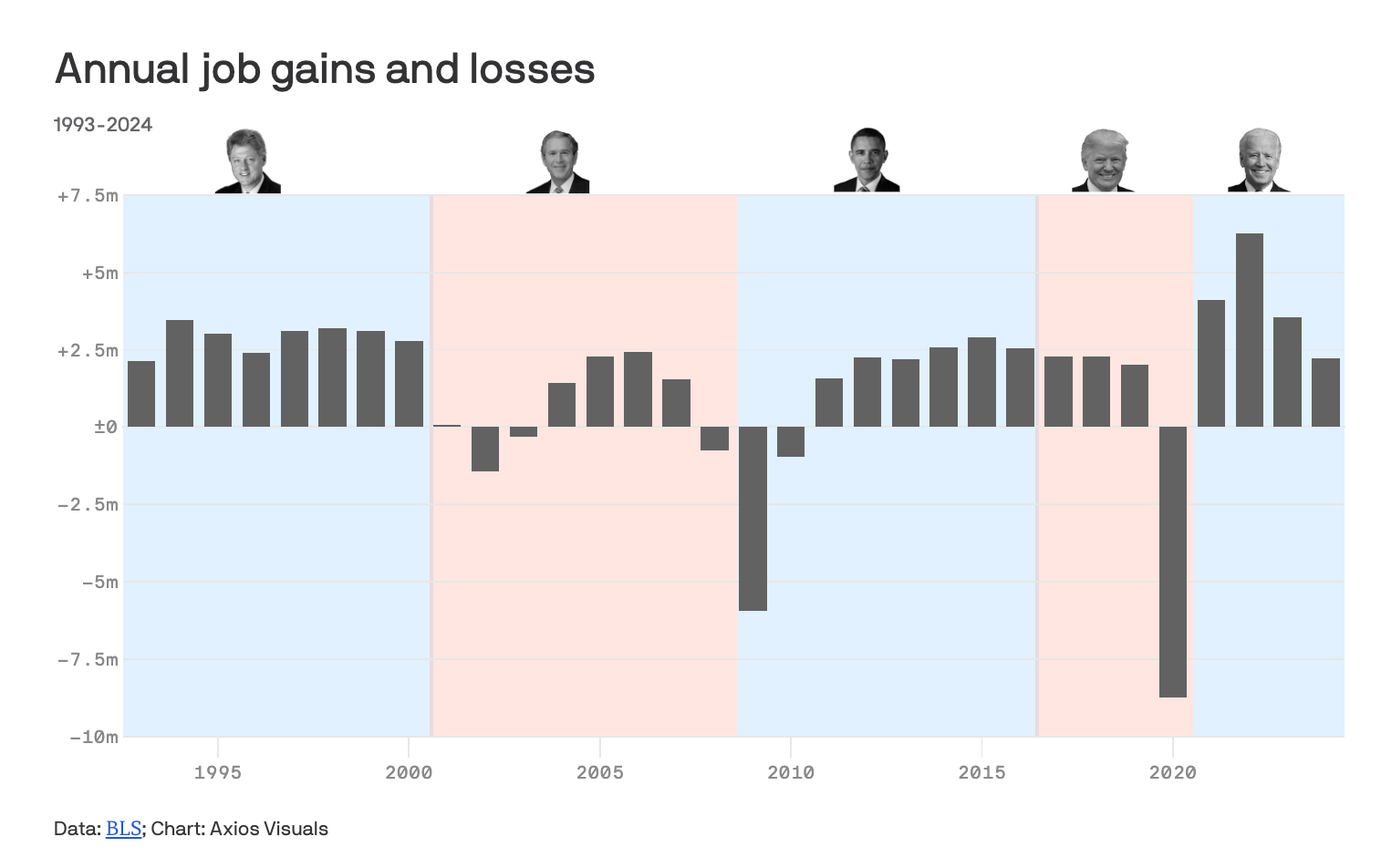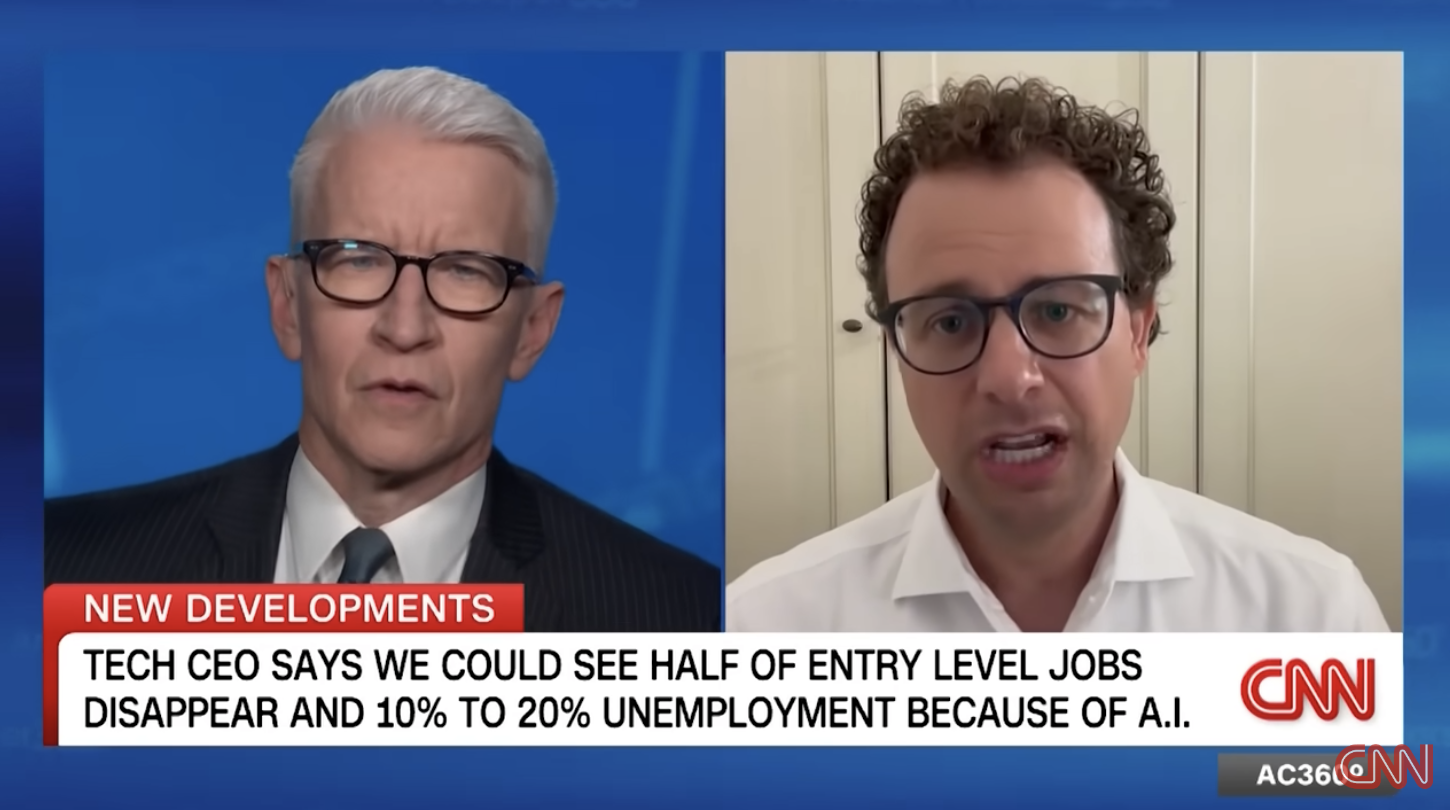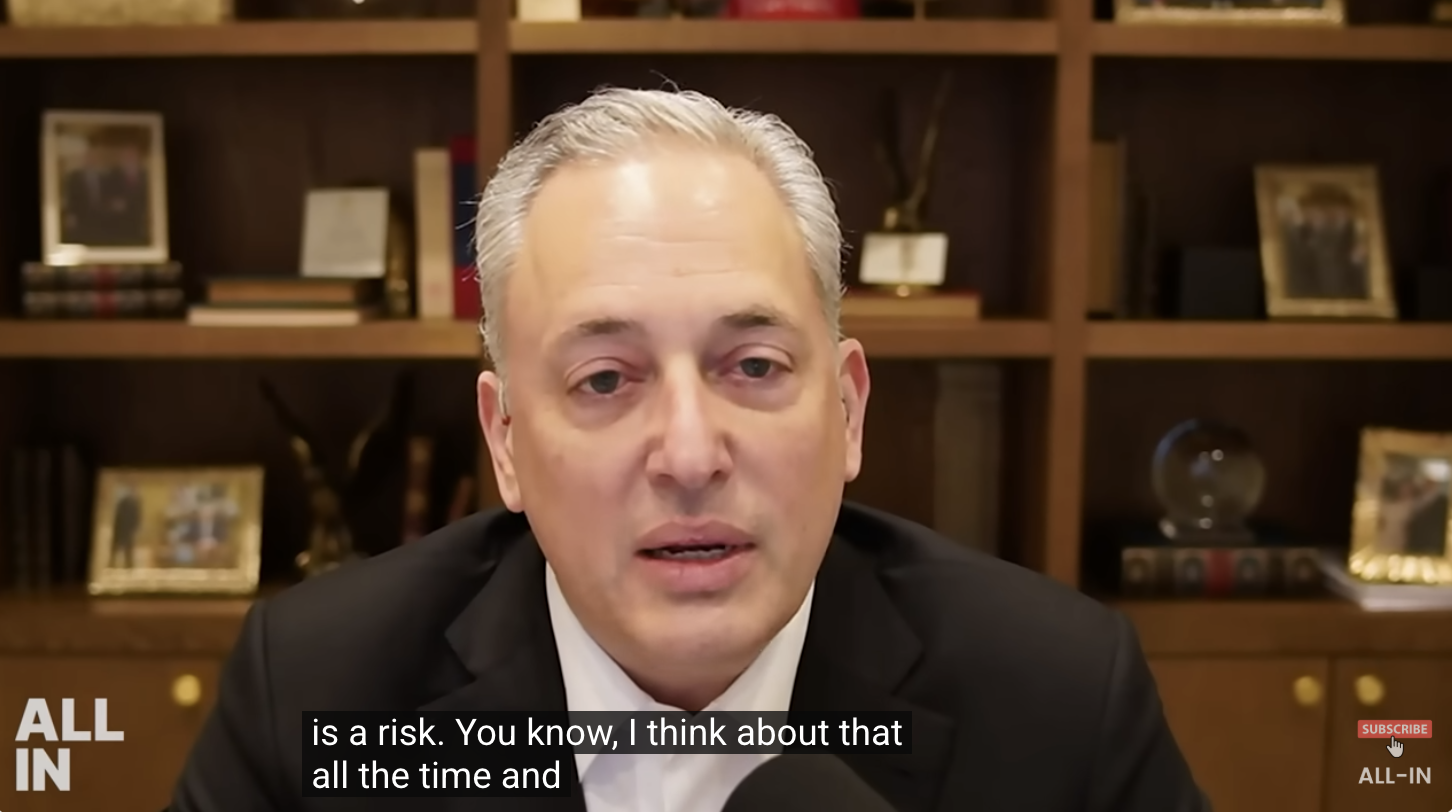
BREAKING NEWS (6 June 2025): The May jobs report released this morning confirms the slowdown in Trump economy, with an initial report claiming 139,00 jobs were created in May. Healthcare (+87K) accounted for most of the gain, while manufacturing and retail posted small declines. The report also noted downward revisions totaling 95,000 for March and April. Disappointing January and February jobs numbers had already been revised downward, too. Which means, so far in 2025, job creation has averaged only 124,000 per month. For comparison, under Biden job growth averaged more than 340,000 per month from January 2021 to December 2024. Today's article explains why — because Trump — the current jobs crisis will only get worse from here. As always, my content is free to read and share. All paid support is voluntary but deeply appreciated. Article begins below.
Trump's unique blend of stupidity and psychopathy has ensured that, in addition to relentless corruption, his presidencies will be remembered for the damage caused to the country by his incompetence and recklessness.
Trump left office in 2021 as the worst jobs president in modern history (and not just because of the pandemic, writes The Washington Post).

Trump's second term could be much, much worse
It starts at a very fundamental level. As stories about vicious and indiscriminate ICE raids make headlines and fill social media feeds, "Trump has no plan for who will grow US food," reports The Guardian. With summer about to begin, "the fate of the hundreds of thousands of undocumented farm workers remains in limbo."
Trump's policies are also crippling small businesses, or what the GOP used to call, "the backbone of the US economy." Due to TACO Trump's tariff chaos, small businesses — which create two out of three new jobs in America — are no longer confident about America's growth prospects. They are hitting pause on new hiring, reports Inc.
Meanwhile, the "Trump Slump" in international travel is hurting everyone from airlines to hotel chains to AirBnB owners to local businesses. It's also causing a collapse in summer job opportunities for teens, reports Scripps News.
But the biggest jobs crisis of all may be the millions of Americans losing jobs to automation as Trump embraces his tech-bro donors' vision of "AI acceleration" at all costs.
The Biden plan: an embrace of "generative AI" to benefit US workers
Biden inherited a disaster yet succeeded beyond all expectations, generating 16.1 million jobs in just 4 years. He created more jobs per month than even Bill Clinton. Then he handed Trump an economy that was, said The Economist, "the envy of the world."

Biden also led America through the birth of generative AI.
After ChatGPT entered the public arena in late 2022, it quickly became apparent that we were entering a new era. Unlike previous technological shifts that mainly affected manual labor, the newest AI advancements were an imminent threat to white-collar, cognitive, and knowledge-based jobs — from coders and writers to financial analysts and paralegals.
Advances in image-making and video generation meant that soon, as I wrote in December 2023:
Creative people of all types — from Hollywood writers and actors to journalists to novelists to photographers to designers to musicians to songwriters to voice-over artists — are waking up to the realization that AI can already approximate enough of what they do to make them redundant. Literally.
Goldman Sachs warned in 2023 that the advent of generative AI meant that 300 million jobs worldwide — roughly one in nine — were vulnerable to the relentless march of automation.
Also in 2023, McKinsey suggested that, by 2030 advances in generative AI would mean that 30% of all hours worked in the US could be automated.
As OpenAI CEO Sam Altman, TIME's 2023 CEO of The Year, told that magazine: "No one knows what happens next."
Biden, sensibly, wanted AI to be developed in ways that were "Safe, Secure, and Trustworthy," stating in an October 2023 Executive Order that:
The responsible development and use of AI require a commitment to supporting American workers. As AI creates new jobs and industries, all workers need a seat at the table, including through collective bargaining, to ensure that they benefit from these opportunities. My Administration will seek to adapt job training and education to support a diverse workforce and help provide access to opportunities that AI creates. In the workplace itself, AI should not be deployed in ways that undermine rights, worsen job quality, encourage undue worker surveillance, lessen market competition, introduce new health and safety risks, or cause harmful labor-force disruptions. The critical next steps in AI development should be built on the views of workers, labor unions, educators, and employers to support responsible uses of AI that improve workers’ lives, positively augment human work, and help all people safely enjoy the gains and opportunities from technological innovation.
In January 2025, Trump, under the influence of Elon, the rest of the broligarchs and America's new AI and Crypto Czar David Sacks, tore that EO up.
Trump's new Executive Order "removed the barriers." It allowed our new, sci-fi obsessed tech overlords to accelerate at warp speed before the rest of us could realize that the phasers were no longer set only to stun.
With Trump the only plan is dominance and deregulation. There's no commitment to AI safety. And there's no safety net for workers.
"The AI jobs apocalypse may already be here"
Trump’s new policy of relentless AI accelerationism —including a potential 10-year moratorium on states' abilities to protect their own citizens — is already putting the future of millions, particularly younger and entry-level workers, at risk.
Millions of young Americans graduating in the inaugural Class of Trump 2.0 find themselves looking for work "in industries that have little use for their skills, view them as expensive and expendable, and are rapidly phasing out their jobs in favor of artificial intelligence," writes Kevin Roose in The New York Times.

Across multiple industries, job opportunities are drying up. Long-planned career paths are turning into dead-ends.
Salesforce has used AI to reduce workforce costs by $50 million this year.
Meta's Mark Zuckerberg is so committed to improving efficiency with AI that's he's now demanding managers fire "high performers" if they can't find enough "low performers" to cut loose.
Walmart just fired 1,5oo people as it embraces AI to enhance its operational efficiency.
IBM is replacing HR workers with AI.
"It does not matter if you are a programmer, designer, product manager, data scientist, lawyer, customer support rep, salesperson, or a finance person, AI is coming for you"—Fiverr CEO Micha Kaufman, in an email to employees
Crowdstrike fired 5% of its workforce — about 500 employees — and replaced them with AI.
Shopify now requires teams to prove that a job can't be done by AI before they ask for more headcount.
Business Insider is slashing 21% of its staff as it goes "all-in on AI."
Fiverr CEO Micha Kaufman, has already told his employees that AI is coming for all their jobs.
McKinsey is trying to prove its predictions correct by letting AI "take over junior employee tasks." Its proprietary Lilli AI creates drafts proposals and Powerpoint presentations. The firm has cut 5,000 staff so far.
On May 28, Axios reported that Anthropic CEO Dario Amodei was now warning that "AI could wipe out half of all entry-level white-collar jobs — and spike unemployment to 10-20% in the next one to five years." He talked more about those predictions with Anderson Cooper on CNN.
"The ordinary person has a certain amount of leverage because they're contributing to the economy.If that leverage goes away, then it's harder to make democracies work, and it's harder to prevent concentration of power"—Anthropic CEO Dario Amodei on CNN
Meanwhile, some tech CEOs are already using AI to replace themselves.
Just kidding. They're using AI avatars of themselves on earnings calls so they always look well-groomed and no one can see them sweat.
Meanwhile, the AI accelerationists promise "abundance" with no plan to actually achieve it
What was true when Sam Altman said it in 2023 is still true today: "No one knows what happens next."
But if we believe McKinsey or Goldman Sachs or what Elon Musk says about self-driving cars, millions of jobs — perhaps tens of millions — could be replaced by AI before the end of the current Trump term.
"The unemployment rate for college grads has increased 30% since 2022," wrote LinkedIn executive Aneesh Raman Namesh in The New York Times on 19 May 2025.
And AI is not just automating many entry-level tasks.
It's taking over customer service for retailers.
It's replacing "content creators" across the media, advertising and entertainment sectors.
It's giving law firms new ways to accomplish more with fewer paralegals, legal researchers, junior associates, and document review lawyers.
It's creating new worker surveillance tools (the kind Biden warned us about), allowing companies to not only "manage" employees with fewer human managers, but also to let AI decide who to fire without getting all emotional about it.
Don't worry! say the accelerationists. Embrace the disruption! Look what happened in the Industrial Revolution! More productivity! More investment! The whole world got richer! Workers even started getting weekends off! It'll be like that, but 10X better! 50X better! 1000X better!
Just ignore the 'non zero' risk that AI destroys all of humanity, they whisper.

David Sacks — previously best known as Elon's "Mini-Me" on Twitter before he became Trump's AI Czar — spent many minutes on a recent All-In podcast bashing "doomers" like Anthropic CEO Amodei before admitting: "There is some nonzero risk of AI growing into a super intelligence that's beyond our control... that is a risk you know I think about that all the time and I do think we should be concerned about it."
Like many who preach the new AI religion of "abundance," Sacks and his All-In besties also insist that we can't currently afford Food Stamps or Medicaid. They do love the tax cuts, though.
But the biggest problem is: They simply can't exactly explain how America gets to this new state of abundance without everyone killing each other (or getting killed by the superintelligence) first. Remember, their plan involves cutting Food Stamps and Medicaid just as they are leading us into an inevitably painful period of disruption that's already being called "the post-labor economy."
If the broligarchs, billionaires and centimillionaires don't seem worried, it's because they'll all be waiting out the societal collapse in their well-stocked, impenetrable doomsday bunkers.
Accelerationists have no answers to people's legitimate concerns about the millions of jobs that AI might kill. They simply repeat the mantra that more jobs will be created because technological innovation always leads to more jobs being created.
They pretend not to hear the follow-up question: Once AI becomes smarter, stronger and cheaper to employ than any human ever was, why won't companies just use that to do all the new jobs, too?
No one knows what's going to happen
I don't know much (though I'm pretty sure Mountainhead was real).
But the people running the world don't seem to know much more than me.
Case in point: U.S. Federal Reserve Governor Michael S. Barr spoke at the Reykjavík Economic Conference 2025 in Iceland on May 09.
Barr is one of the six Federal Reserve decision-makers who confer with their Chairman Jerome Powell to oversee the Federal Reserve System and implement U.S. monetary policy.
In his speech, he said the same B.S. everybody else says.
Here are 10 verbatim excerpts from his speech:
- "A pessimistic view is that AI and robotics could become so capable and cost effective as to render most human labor obsolete, culminating in mass unemployment."
- "The many waves of technological advances over the centuries haven't rendered humans obsolete. For example, many of the tasks that were performed by humans in the 1950s are now performed by computers and robots, and yet the unemployment rate is similar to what it was back then, while the labor force participation rate is higher overall."
- "However, the amazing potential capabilities and breadth of applications associated with AI—many of which are already apparent—make it worth asking whether this time may be different."
- "Let's start with the 'gradual' scenario... a plausible conjecture is that we could see, for example, fewer human programmers, lawyers, or commercial drivers... even incremental change may allow AI to become accurate and cheap enough to replace some occupations altogether... It's difficult to envision the novel jobs that will replace the ones we might lose to an incremental AI scenario."
- "Another possibility is that the labor share of income could decline, if capital owners benefit more than wage earners—for example, because the gains accruing from AI adoption go to large, highly capitalized firms whose technical capabilities, consumer networks, and training data allow them to develop state-of-the-art AI techniques."
- "Now let's consider an alternative scenario in which AI completely transforms the economy... Under this scenario, AI would take over a broad range of existing jobs. As economist Anton Korinek writes, 'AI systems advance toward mastering all forms of cognitive work that can be performed by humans, including new tasks that don't even exist yet.'"
- "Transformative AI could imply a much smaller role for human labor — a development that would entail sweeping social changes and profound challenges for government.
- "It's difficult to say how many jobs will exist under transformative AI. On the one hand, it's possible that—as has happened so often in the past—the economy will find inventive new ways to keep most people employed. On the other hand, there are concerns that some workers could experience a large enough decline in their earnings potential that paid work may no longer be an available option."
- "Employment and labor force participation could fall; displaced workers may grapple with a loss of daily routines, social connectedness, and the meaning they derived from employment. The risk of a significant decline in employment looms large in many people's concerns about AI, and it's important for policymakers to be attentive to that risk."
- "How might transformative AI affect income inequality? Both traditionally high-wage occupations, such as lawyers and financial professionals, and lower-wage occupations, such as factory and retail workers, could be automated, and it is difficult to predict how AI would affect wage structures."
To sum up: Biden's Executive Order on AI gave workers a seat at the table. Trump's EO — combined with the crimes of DOGE — has given union-busting broligarchs the untrammeled power to reshape society at hyperspeed. The Trump jobs crisis is upon us. And policymakers are absolutely not being attentive to the risks of AI.
Or, as U.S. Federal Reserve Governor Michael S. Barr, explained in Iceland: "Even if AI ultimately creates as many jobs as it eliminates, we should expect that the transition will be difficult."
Thanks for reading! While paid subscriptions (billed to TLD Media LLC) and one-time tips are always welcome, all content to this ad-free newsletter is free, so subscribe for $0 and you won’t miss anything. And feel free to share this content knowing there’s never a paywall!
P.S. This really is the time to get off X once and for all. Please find me on Bluesky and these other places.
Subscribe to Unprecedented
Subscribe to the newsletter and unlock access to member-only content.